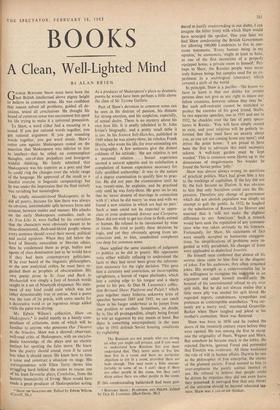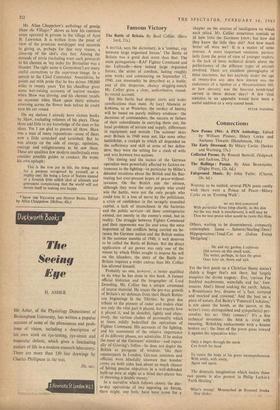BOOKS
A Clean, Well-Lighted Mind
BY ALAN BR LEN GEORGE BERNARD SHAW must have been the last British intellectual above pigmy height to believe in common sense. He was confident that reason solved all problems, guided all de- cisions, tested all conclusions. He thought his brand of common sense was uncommon but spent his life trying to make it a universal possession.
To Shaw, a word either had a meaning or a sound. If you put rational words together, you got rational argument. If you put sounding words together, you got word music. Shaw's entire case against Shakespeare rested on the assertion that Shakespeare was inferior to him in intellect—that he relied on commonplace thoughts, out-of-date prejudices and bourgeois wishful thinking. He freely admitted that Shakespeare was his superior as a poet and that he could ring the changes over the whole range of the language. He approved of the result as a tuneful exercise in linguistic campanology but he was under the impression that the final melody was ravishing but meaningless.
He totally misunderstood Shakespeare, as he did all poetry, because for him there was always an obvious, unmistakable split between form and content, between matter and manner. His attacks on the early Shakespeare comedies, such as As You Like It, were fuelled by his conviction that the characters were obviously meant to be three-dimensional, flesh-and-blood people whose every sentence should reveal their moral, political and social opinions. When they fell below the level of Ibsenite naturalism or Shavian ethics, then he condemned them as prigs, bullies and agents, of class domination just as he would have if they had been contemporary politicians. if he ever heard of the linguistic philosophers, or the new analytical critics, he must have re- garded them as prophets of obscurantism. His own poetic prose in St. Joan and Back to Methuselah was simply a fuzz of hoorah words caught in a net of Ninetyish eloquence. No state- ment of any kind could exist which was not either demonstrably true or untrue. And a poem was the sum of its précis, with extra marks for a decorative word or an ingenious image added while the paint was drying.
Mr. Edwin Wilson's collection, Shaw on Shakespeare,* is useful mainly as a handy com- pendium of criticisms, most of which will be familiar to anyone who possesses. Our Theatres in the Nineties. Shaw was a shrewd,. observant, well-read critic of Shakespeare, with an encyclo- pmdic knowledge of the plays and an electric Instinct for spotting the false move. He knew how the poetry should sound, even if he cared less what it should mean. He knew how to time a scene and construct a situation on stage. His correspondence with Ellen Terry shows him struggling hard behind the scenes to rescue one of his least favourite plays, Cymbeline, from the hammy insensitivity of Irving. Shaw would have made a great producer of Shakespearian acting.
* SHAW ON SHAKESPEARE, Edited by Edwin Wilson. (Cassell, 30s.)
As a producer of Shakespeare's plays as dramatic poems he would have been perhaps a little above the class of Sir Tyrone Guthrie.
Part of Shaw's devotion to common sense can be seen in his distrust of passion, his distaste for strong emotion, and his suspicion, especially, of sexual desire. There is no mystery about his own love life. It is neatly tabulated in St. John Irvine's biography, and a pretty small table it is too. In his Sixteen Sell-Sketches, published in 1949 when he was ninety-three, he rebukes Frank Harris, who wrote his life, for over-estimating sex in biography. A few sentences give the distant coldness of his attitude : 'the sex relation is not a personal relation. . . . Sexual experience seemed a natural appetite and its satisfaction a completion of human experience necessary for fully qualified authorship.' It was in the nature of a degree examination to qualify him to prac- tise. He did not pass the examination until he was twenty-nine, he explains, and he practised only until he was forty-three. He goes on to say that he `never dreamt of marriage in connection with it'; when he did marry 'as man and wife we found a new relation in which sex had no part.' Such a man could not be expected to appre- ciate or even understand Antony and Cleopatra. Shaw did not wish to get too close to flesh, animal or human. He refused to be intoxicated by wine or kisses. He tried to justify these decisions by logic, and yet they obviously sprang from un- conscious and, to him, unadmitted complexes too deep for common sense.
Shaw applied the same standards of judgment to politics as he did to poetry. His opponents were either wilfully refusing to understand the facts or they had never been given the informa- tion necessary for the right decision. This gave him a certainty and conviction, an incorruptible uprightness, a hatred of vague platitudes, which lent a cutting edge to his tongue and a sharp point to his pen. In Dan H. Laurence's collec- tion Bernard Shaw: Platform and Pulpit,t which puts together many hitherto unknown texts of speeches between 1885 and 1943, we can catch Shaw in his Jaeger underwear as he jumps from one position to another. Sometimes, no doubt, he is, like all propagandists, simply being forced to win an argument by any means at hand. But there is something unsympathetic in the man who in 1931 defends Soviet housing conditions by explaining
The Russians are not people who are strong on what you might call privacy, and if you want to understand how Russians live you must understand that. They never seem to live less than five in a room and have no particular objection to ten in a room, provided there are beds enough. This may seem a little uncom- fortable to some of us. I can't sleep if there are other people in the room, but they can't sleep unless there are other people in the room.
If this condescending balderdash had been pro-
t BERNARD SHAW : PLATFORM AND PULPIT. Edited by Dan H. Laurence. (Hart-Davis, 30s.) duced to justify overcrowding in our slums, 1 can imagine the bitter irony with which Shaw would have scourged the speaker. One year later we find Shaw condemning the British Government for allowing 100,000 Londoners to live in one- room tenements. 'Every human being in my opinion,' he announces, 'ought at least to have, as one of the first necessities of a properly equipped home, a private room to himself.' Per- haps to Shaw, the Russian people were never truly human beings but samples used for an ex- periment in a sociological laboratory which covered a sixth of the world.
In principle, Shaw is a pacifist—`the lesson we have to learn is that our dislike for certain persons does not give us any right to injure our fellow creatures, however odious they may be.' But such self-restraint cannot be stretched to protect the enemies of his good friend, Stalin. In two separate speeches, one in 1931 and one in 1932, he chuckles over the fate of petty specu- lators in Russia : 'You will have simply ceased to exist, and your relatives will be politely in- formed that they need have no anxiety about you, as you are not coming home any more'; and drives the point home: '1 am proud to have been the first to advocate this most necessary reform. A well-kept garden must be kept weeded.' This is common sense blown up to the dimensions of megalomania. No wonder he found the Soviet police 'jolly.'
Shaw was almost always ,wrong on questions of practical politics. Marx had given him a key to the workings of capitalism. If the key did not fit, the lock became an illusion. It was obvious to him that only Socialism could cure the De- pression. Therefore any change of government which did not abolish capitalism was simply an- attempt to gull the public. In 1932, he laughed at the substitution of Roosevelt for Hoover and asserted that it 'will not make the slightest difference to any American.' Such a remark would have sunk the reputation of any commen- tator who was taken seriously by his listeners. Fortunately, for Shaw, his statements of fact were usually accepted as humorous exaggera- tions, his simplifications of problems were re- garded as witty paradoxes, his changes of front were applauded as dialectical fonettes.
He himself once confessed that almost all his serious ideas came to him first in the disguise of jokes. For his audiences, they often remained jokes. His strength as a controversialist lay in his willingness to recognise the ing*table in an argument and adapt himself imniEdiately. He boasted of his unsentimental refusal to cry over spilt milk. But he did not always realise that a little more pity was needed for spilt blood. He regarded regrets, condolences, sympathies and pretences as contemptible anaesthetics. 'You cer- tainly are a merry soul,' murmured Granville- Barker when Shaw laughed and joked at his mother's cremation. Shaw was flattered.
Shaw was born in 1856 and he rushed the doors of the twentieth century years before they were opened. He was among the first to recog- nise the originality of Ibsen, Wagner and Marx. But somehow he became stuck in the lobby. He rejected Darwin, ignored Freud and pretended that Einstein was irrelevant. All three weakened the role of will in human affairs. Darwin he saw as the philosopher of free enterprise, the enemy of the planned society. Freud seemed to him to over-emphasise the purely animal instinct of sex. He refused to believe that people could be driven by impulses they did not even know they possessed. It outraged him that any theory of the universe should be beyond educated lay- men. Shaw was a yes-or-no thinker. Mr. Allan Chappelow's anthology of gossip, Shaw the Villager,* shows us how his common sense operated in private in the village of Ayot St. Lawrence. It is written from the point of view of the prostrate worshipper and succeeds in giving us, perhaps for that very reason, a close-up of the idol's clay feet. Among the mounds of trivia (including even such postcards to his chemist as 'my order for Bermaline was a blunder. The right name is Germolene') are many useful correctives to the superman-image. In a speech to the Chief Constables' Association, he points out with pride that he has driven 100,000 miles in twenty years Yet his chauffeur gives some hair-raising accounts of narrow escapes when Shaw was driving, and his chemist recalls an occasion when Shaw spent thirty minutes reversing across the flower beds before he could turn his car round.
On my shelves 1 already have sixteen books by Shaw. excluding volumes of his plays. These three add little to my knowledge of the man or his ideas. Yet I am glad to possess all three. Shaw was a man of many reputations—some of them now a little scratched and tarnished. But he was always on the side of energy, optimism, courage and enlightenment as he saw them. These are qualities few modern intellectuals even consider possible guides to conduct. He wrote his own epitaph:
This is the true joy in life, the being used for a purpose recognised by yourself as a mighty one; the being a force of Nature instead of a feverish little selfish clod of ailments and grievances complaining that the world will not devote itself to making you happy.
* SHAW THE VILLAGER AND HUMAN BEING. Edited by Allan Chappelow. (Skilton, 42s.)


































 Previous page
Previous page